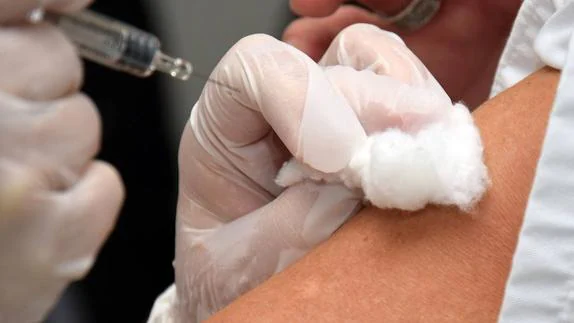Researchers in Malaga take part in testing a vaccine for Type One diabetes
The study is being carried out in Spain, the Czech Republic and Sweden to test the effectiveness of the drug on young people who have been recently diagnosed
ÁNGEL ESCALERA
Lunes, 8 de octubre 2018, 11:24
Professionals from the diabetes unit at the Malaga Regional Hospital (based in the Hospital Civil) are taking part in a European multicentric study which is being developed in Spain, the Czech Republic and Sweden, to study the effectiveness of a vaccine against Type 1 diabetes in children and young people (aged between 14 and 24) who have been diagnosed in the past six months.
The objective of the tests, known as the Diagnode-2 clinical trial, is to verify the effects of the new treatment (Diamyd) on the patients and see whether or not the pancreas continues to produce insulin.
In Malaga, the chief researcher on the project is also the head of the diabetes unit in the Endocrinology and Nutrition department at the Regional Hospital, Marisol Ruiz de Adana. She says the study will show whether the vaccine can be used to preserve the beta cells (that produce insulin) which are attacked when diabetes occurs. It is the T lymphocytes in the patient's immune system which, mistakenly, destroy these cells.
"What the vaccine tries to do is cheat the immune system for as long as possible so that the pancreatic reserve of people aged between 12 and 24, who have been diagnosed recently with Type 1 diabetes, is maintained for six to eight years instead of two, which is what happens at present," says Dr Ruiz de Adana.
This endocrinologist, who is an expert on diabetes, emphasises that the vaccine being tested is not a cure, but if it can help to preserve the pancreatic insulin reserve for several years that would be extremely beneficial for patients.
The clinical trials are being carried out on 80 people with Type 1 diabetes in Spain, the Czech Republic and Sweden. Of them, three are from Malaga (two boys who were 17 when they were selected, and a 12-year-old). The treatment consists of three injections (one a month) in the groin area.
In Spain, researchers and patients from Malaga, Bilbao, Madrid, Barcelona, Seville and Zaragoza are taking part. The general coordinator of this multicentric study is Swedish professor Johnny Ludvigsson. In Spain, the project coordinator is Luis Castaño. In Malaga, as well as Dr Ruiz de Adana, doctors Juan Pedro López Siguero (chief researcher in the Paediatric department), Francisca Linares, Marta Domínguez, Isabel Leiva and Marta Pacheco are also involved, together with nurses Inmaculada Benavides and Francisco Ramos.
The patients included in the Diagnode-2 clinical trial start the treatment by taking vitamin D or a placebo (a substance which, although it lacks any therapeutic action, produces a favourable effect in a patient if he or she is convinced that it can have such an effect). Later, half of the patients are injected with the vaccine, Diamyd; the other half are injected with a placebo. All the injections are into a lymph node in the groin with ultrasound guidance by an experienced radiologist and under local anaesthetic.
The study will last for 15 months. Neither the patients nor the doctors know who is injected with the vaccine and who is given the placebo. This clinical test has been approved by the Spanish Medication and Sanitary Products Agency.
A great opportunity
One of the youngsters in Malaga who is taking part in the study says it is "a great opportunity". The 18-year-old, who injects himself with an insulin pen, was 17 when he was diagnosed with Type 1 diabetes on 25 November 2017.
"I have nothing to lose by taking part in the clinical trial. If I'm one of the people who is being given the vaccine, it could help me, and if I've been given the placebo it won't harm me and I will have been able to help with the research," he says. He has nothing but praise for the nursing staff who have been looking after him during this research project.
